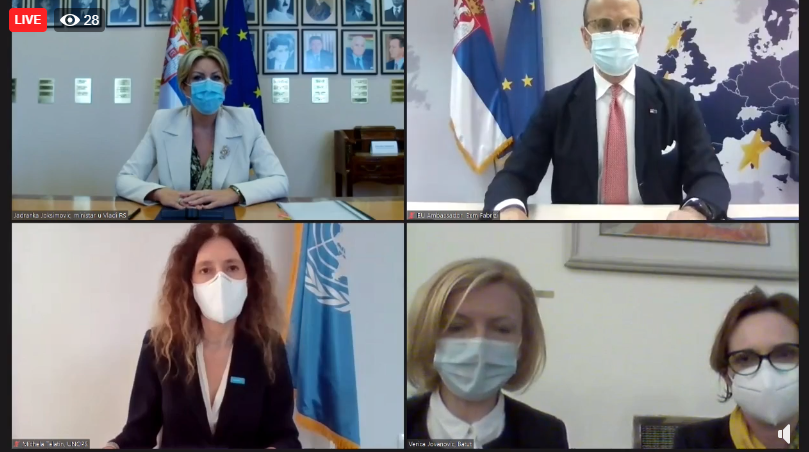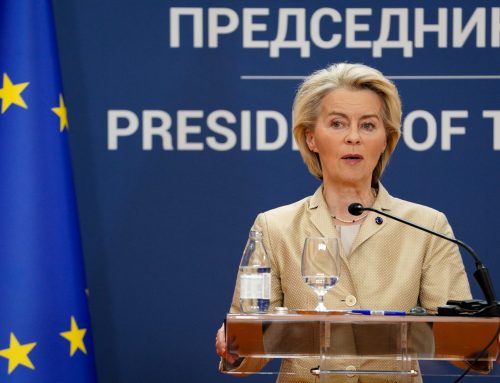Doctor, nurses, administrative staff—some 200 medical professionals will be given employment as part of European Union’s assistance in fighting coronavirus in Serbia.
Head of the EU Delegation to Serbia Ambassador Sem Fabrizi, Serbian Minister of European Integration Jadranka Joksimović, Head of UNOPS in Serbia Mikela Telatin, and Director of the Institute for Public Health of Serbia Dr Milan Jovanović-Batut prof. Verica Jovanović signed today an agreement that will allow the hiring of around 200 medical professionals as part of the efforts to support the fight against the COVID-19 pandemic using EU funding.
“We gathered here today to officially launch an EU’s solidarity initiative thanks to which 200 Serbian medical professionals will be hired to help the fight against COVID-19. Medical professionals, including doctors, nurses, lab technicians, and administrative staff, who will be hired in coordination with Institute Batut, will be deployed to public health institutes, hospitals, healthcare centres, and laboratories across Serbia, where they will provide additional assistance. Over the next six months, these 200 professionals will be working on the front lines in municipalities that are bearing the brunt of the pandemic, such as Belgrade, Kragujevac, Užice, Valjevo, Čačak, Šabac, Kraljevo, and Novi Pazar,” Ambassador Fabrizi explained.
He added that this is another initiative launched jointly by the EU, the Republic of Serbia, and UNOPS, and described it as merely a new phase in the continuous cooperation.
“In March, Serbia requested assistance in the form of purchase and transport of emergency medical equipment. Therefore, in March and April of this year, Minister Joksimović and I signed two major donations. The first donation covered the costs of delivery of more than 700 tons of medical equipment purchased by Serbia using 15 cargo airplanes, while the second donation included the purchase and delivery of masks, ventilators, triage containers, etc.,” Ambassador Fabrizi noted.
“Besides, we set aside EUR100 million to support the most vulnerable groups, such as the elderly, women, Roma, and migrants.”
Ambassador Fabrizi stated that the European Union is tackling the economic side of the fight against COVID-19 in order to support Serbian SMEs and help them recover from the crisis. That is why a new project focused on boosting tourism in 12 municipalities in eastern Serbia was launched last week.
We are facing this crisis together and we will recover from it in the same manner, said Ambassador Fabrizi and thanked once again Minister Joksimović, Mrs. Telatin, and doctor Jovanović for their efforts.
The Ambassador also thanked all medical professionals who are working tirelessly to suppress the disease.
“I believe this is a crucial event in the overall support the European Union has continuously provided to Serbia since the outbreak of the pandemic,” Minister of European Integration Jadranka Joksimović acknowledged.
She reminded about the generous European assistance in the form of equipment purchase. According to the Minister, the equipment meant a great deal for our healthcare system as it strengthened it further.
“The pandemic is not slowing down, either in Serbia or the world, and it will take a continuous relationship to defeat it. The EU has for years supported the efforts to strengthen our healthcare system.”
This time, the assistance is focused on human resources, the Minister said, pointing to the hard work done by medial workers every day.
“EUR1 million from the IPA II fund has been allocated to hire around 200 people who will form part of healthcare teams made up of one doctor, two nurses, and one administrative clerk.”
The Minister described the assistance as another proof of EU’s solidarity with Serbia.
“This is a major opportunity and support from the European Union—this investment in human resources comes at a critical time when Serbia is facing great challenges,” said Verica Jovanović of Institute Batut.
According to her, such assistance will promote diagnostics and allow a prompt detection of COVID-19.
“We are investing in our young colleagues who are currently out of work, by allowing them to get professional experience and at the same time help us fight the pandemic.”
The doctor concluded by urging unemployed medical workers to apply for around 200 vacancies.




